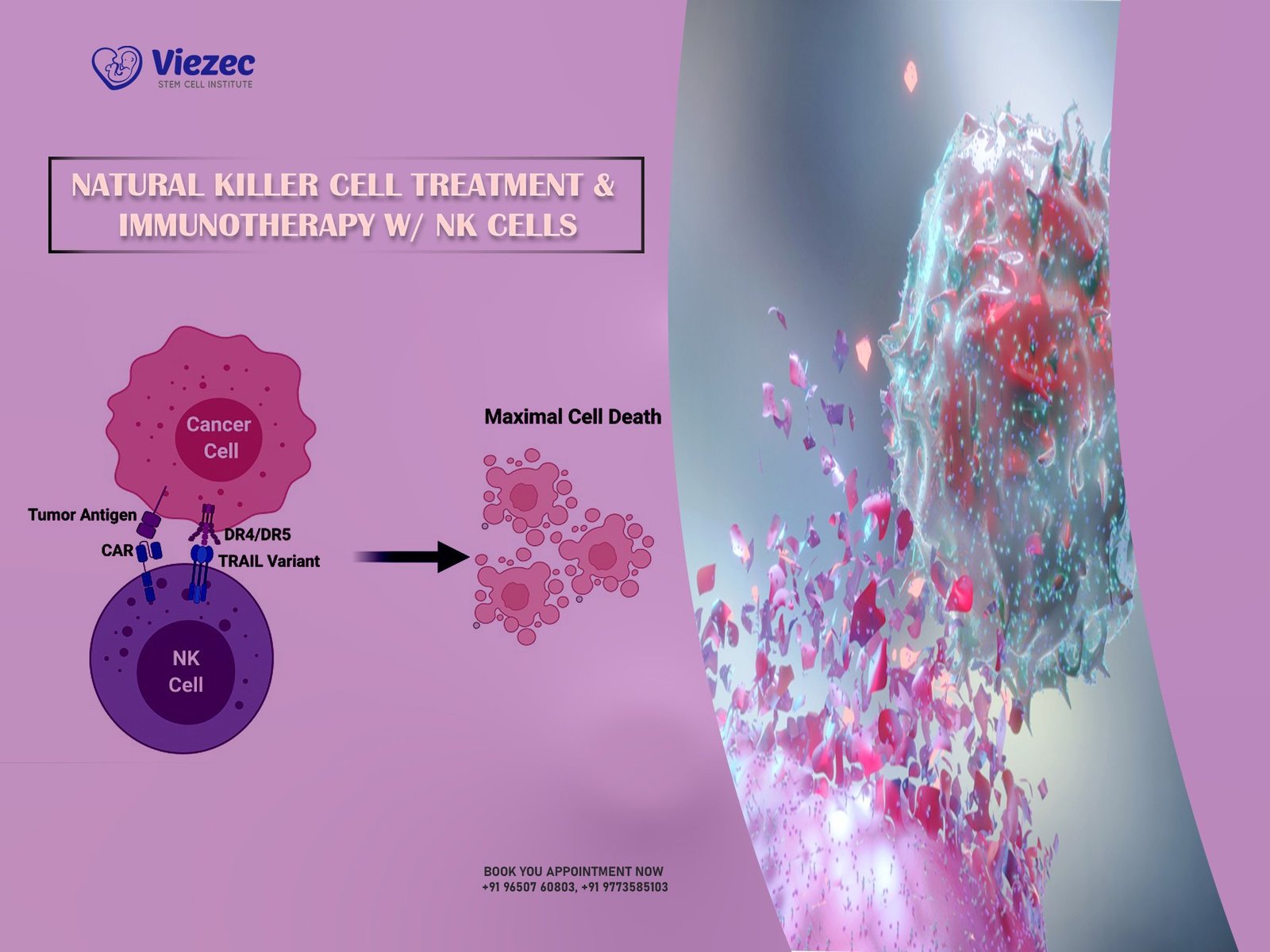In the ever-evolving landscape of medical science, one term has been making waves in recent years: Natural Killer (NK) cells. These unsung heroes of our immune system have emerged as a beacon of hope in the realm of immunotherapy. In this blog, we embark on a fascinating journey into the world of “Natural Killer Cell Treatment & Immunotherapy w/ NK Cells.”
Picture this: a group of sentinel-like cells, equipped with an uncanny ability to distinguish between friend and foe, poised to combat infections and cancers with surgical precision. These are NK cells, and their story is nothing short of extraordinary.
In our quest to unravel the mysteries of NK cells, we’ll explore their pivotal role in immune responses, particularly their unique capacity to identify and eliminate abnormal cells. We’ll delve into the promising realm of NK cell therapy, an innovative approach to combat diseases such as cancer and viral infections.
Join us as we navigate the complexities, breakthroughs, and real-world stories that underscore the immense potential of NK cells in revolutionizing the way we approach healthcare and immunotherapy. Get ready for a journey through the world of these natural-born killers and the exciting prospects they hold for the future.
Introduction
What are Natural Killer Cells?
Natural Killer (NK) cells are a type of lymphocyte, a white blood cell, that plays a pivotal role in our body’s defense against infections and cancers. Unlike other immune cells, NK cells can identify and attack abnormal cells, such as cancer cells and virus-infected cells, without prior exposure. This makes them a crucial part of the innate immune system.
Importance of Natural Killer Cells in the Immune System
NK cells act as the body’s security force, constantly patrolling for invaders. They are a first-line defense against infections and malignancies, acting swiftly to eliminate threats and prevent their spread.
Overview of Immunotherapy
Immunotherapy is a revolutionary approach to treating diseases by boosting the body’s natural defenses. NK cell therapy is a subset of immunotherapy that harnesses the power of these cells to combat various medical conditions.
Role of Natural Killer Cells in Immune Response
Identifying and Targeting Abnormal Cells
One of the most remarkable features of NK cells is their ability to distinguish between healthy and abnormal cells. They do this by recognizing specific molecules on the cell surface, which act as markers for identifying targets.
The Immune Surveillance Function
NK cells are like vigilant sentinels patrolling our body. They continuously scan for cells that display signs of distress, such as viral infections or malignant transformation. When they encounter such cells, NK cells spring into action, initiating a cascade of events leading to the target cell’s destruction.
NK Cells in Cancer Treatment
How Cancer Evades the Immune System
Cancer cells often employ tactics to evade detection by the immune system. They can suppress immune responses, making it challenging for the body to mount an effective defense. NK cells are a potential solution to this problem.
Harnessing the Power of NK Cells in Cancer Immunotherapy
NK cell therapy involves isolating and expanding NK cells outside the body and then infusing them back into the patient. These infused cells are primed to target and destroy cancer cells, offering a novel approach to cancer treatment.
NK Cell Therapy: How It Works
Isolation and Expansion of NK Cells
To perform NK cell therapy, medical professionals isolate NK cells from a patient’s blood or a donor’s blood. These cells are then cultured and expanded in the lab to create a larger population of NK cells for treatment.
Administration of NK Cell Therapy
The expanded NK cells are administered to the patient through intravenous infusion. Once in the body, they seek out and engage with cancer cells, initiating a powerful immune response.
Side Effects and Safety
NK cell therapy is generally well-tolerated, with side effects typically mild and temporary. Common side effects include fever, chills, and fatigue, which usually subside within a few days.
Conditions Treated with NK Cell Immunotherapy
Leukemia and Lymphoma
NK cell therapy has shown promise in the treatment of leukemia and lymphoma, two types of blood cancers. The ability of NK cells to target and destroy cancerous blood cells offers hope to patients with these conditions.
Solid Tumors
Research is ongoing to explore the effectiveness of NK cell therapy against solid tumors, such as breast, lung, and colon cancer. Preliminary results are encouraging.
Viral Infections
NK cells also play a vital role in combating viral infections, making them a potential option for treating diseases like hepatitis and HIV.
Advantages of NK Cell Treatment
Less Risk of Graft-Versus-Host Disease
Unlike some other forms of cell therapy, NK cell therapy carries a lower risk of graft-versus-host disease, a potentially severe complication.
Potential for Off-the-Shelf Therapies
Researchers are working on developing “off-the-shelf” NK cell therapies, where standardized NK cell products can be used without the need for individual cell isolation and expansion.
Enhanced Targeting Abilities
NK cells have a unique ability to adapt and recognize a wide range of abnormal cells, enhancing their targeting capabilities compared to other immune cells.
Limitations and Challenges
Availability and Cost
Access to NK cell therapy may be limited due to its relatively new status and associated costs. Research efforts are underway to make this therapy more accessible.
Managing Side Effects
While generally well-tolerated, NK cell therapy can have side effects that require careful management and monitoring by healthcare professionals.
Research and Development
Continued research is essential to refine NK cell therapy techniques, expand its applications, and improve its effectiveness.
Recent Advances in NK Cell Therapy
CAR-NK Cells
Chimeric Antigen Receptor (CAR) NK cells, engineered with specific receptors, show promise in enhancing NK cell therapy’s precision and efficacy.
Combination Therapies
NK cell therapy is often combined with other treatments like chemotherapy or checkpoint inhibitors to maximize its effectiveness.
Personalized Treatment
Advancements in personalized medicine allow for tailoring NK cell therapy to individual patients, increasing its potential benefits.
Patient Experiences and Success Stories
Testimonials from NK Cell Therapy Recipients
Hearing the stories of individuals who have benefited from NK cell therapy can provide valuable insights into its potential.
Future Prospects of NK Cell Immunotherapy
Expanding Applications
NK cell therapy is likely to find applications in treating a broader range of diseases beyond cancer and viral infections.
Research and Clinical Trials
Ongoing research and clinical trials will pave the way for more refined and effective NK cell therapies.
Road Ahead
As we navigate the exciting frontier of immunotherapy, NK cells are poised to play an increasingly vital role in the future of medicine.
In the realm of medical science, Natural Killer cells represent a beacon of hope. Their unique abilities in immune surveillance and cancer targeting are paving the way for groundbreaking treatments. As research continues to advance, the future of NK cell immunotherapy shines ever brighter, holding the promise of improved outcomes and a better quality of life for countless individuals facing challenging medical conditions.
FAQs
Q1: What are Natural Killer Cells, and how do they work?
Natural Killer (NK) cells are a type of white blood cell that plays a crucial role in the immune system. They work by identifying and destroying abnormal cells, such as infected or cancerous cells, without the need for prior exposure.
Q2: Is NK cell therapy safe?
Yes, NK cell therapy is generally considered safe. Common side effects are mild and temporary, such as fever and fatigue, and can be managed with medical supervision.
Q3: How effective is NK cell therapy in treating cancer?
NK cell therapy shows promise in treating various cancers, particularly blood cancers like leukemia and lymphoma. Effectiveness may vary depending on the specific cancer type and individual patient factors.
Q4: Can NK cell therapy be combined with other treatments?
Yes, NK cell therapy can be combined with other treatments like chemotherapy or immunotherapy to enhance its effectiveness and provide a comprehensive approach to disease management.
Q5: What is the cost of NK cell immunotherapy?
The cost of NK cell immunotherapy can vary widely depending on factors such as the type of disease being treated, the treatment approach, and geographic location. It’s advisable to consult with healthcare providers or clinics for specific cost information.











